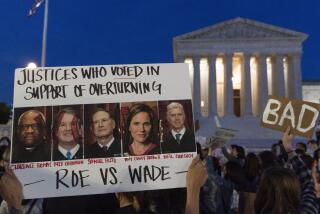Remembering Freedom of Choice
- Share via
It’s Memorial Day Weekend, a time when we traditionally commemorate our nation’s brave veterans by standing in line to see the latest blockbuster, shopping the sales and charring big hunks of meat over an open fire.
This year, a few Americans have found another way to mark the occasion: by not buying Chrysler products. They number among them Holocaust survivors and their families, and World War II vets, as well as people who simply think the Japanese make a better car.
According to a recent Wall Street Journal article, Chrysler’s recent merger with German auto maker Daimler-Benz has these people all worked up. Somehow they can’t seem to forget the image of Der Fuhrer stepping into a shiny black car manufactured by Daimler-Benz. Not your father’s Oldsmobile indeed.
One of Chrysler’s proudest boasts has always been that it produced the Jeeps that helped the Allies win the war. During those years the goals of Daimler-Benz were a little different. Its factory was one of the first to employ concentration camp labor. And as far as we know, Daimler-Benz didn’t have an Oskar Schindler.
True, Daimler-Benz has made reparations and even gone so far as to erect a monument to the slave laborers in front of its headquarters. It only makes sense. If you were a former Nazi auto maker who aimed to sell cars to rich Americans, wouldn’t you do the same?
While Chrysler execs obviously hope to bask in the reflected glory of the famous Mercedes three-pointed symbol, they weren’t counting on it morphing into a swastika. And somehow a statue of slave laborers in front of the Chrysler Building doesn’t seem likely any time soon.
*
As old as I may be--and these days I feel my age climbing up there almost as quickly as Chrysler’s stock prices since the merger--I am too young to remember WWII. What I do remember is the war culture that lasted long after the war was over: the movies, the comics, “Hogan’s Heroes,” even my brother’s GI Joes.
What about those tough, swaggering saviors in metal helmets from my moviegoing childhood, handing out American chewing gum to grateful French schoolchildren? If I’m shocked by the image of Chrysler and Daimler-Benz in bed together, what would Pvts. Rizzo, Goldstein, Kowalski and Jones make of it? Why, it’s almost as though Rolls-Royce were to merge with Volkswagen. Oh, that did happen? Well, you see what I mean.
I’m a good person. I recycle. I bring my own cup to Starbucks. I even cut back on aerosols. On the other hand, I can’t begin to contemplate boycotting products based on their global connections at this late date. It’s way too complicated. I know if I open that can of peas, my squeaky tub toys will turn out to be manufactured by a subsidiary of the company that came up with napalm (Dow Chemical, which recently merged with Germany’s Hoescht Pharmaceutical).
You see, in the business world right now, there’s more merging going on than in West Hollywood on a Saturday night. Travelers merged with Citibank, BankAmerica swallowed NationsBank, Bertelsmann engulfed Random House, and it even looks like the old AT&T; nationwide local phone system might be rising from the dead.
Not long from now I figure there won’t even be any stores anymore, just a slot that you stick your bank card into and it automatically debits your account and ships you everything you need. The slot will be called Victoria’s Ikea ‘R’ Us. Of course, there’ll be a catalog and Web site.
Professor James Brock, from the business management school at Ohio’s Miami University, has another, interesting take on the recent spate of mergers. His position, in layman’s language for the non-MBAs among us, is that he’s agin’ ‘em. He claims mergers don’t result in increased productivity or better products, only less freedom of choice.
*
Brock blames “lax antitrust enforcement.” (Well, duh, and incidentally Mr. Eisner says thank you, Congress, for the Disney-ABC deal, and Mr. Murdoch would like to add his thanks also, while Bill Gates wonders why everybody keeps picking on him.) “We might as well have everyone merge together,” he says. “It’s starting to look like the centrally planned Soviet economy.”
How drab, how dull. How un-American. Wasn’t freedom of choice one of those four freedoms our boys were supposed to be fighting for? Or did I get it wrong, and it was simply the freedom to shop at identical malls all over the country where they always have the same kind of frozen yogurt?
*
Imagine a world where all hamburgers were either Wendy’s, McDonald’s or Burger King, all shoes were made by Nike, Adidas or Reebok, and every breakfast cereal in the supermarket came from Kellogg, General Mills or Post. And for fun, you could choose which movie about something from space hitting the Earth you wanted to see, the one with the comet or the one with the asteroid. Oh, it’s already like that throughout most of the country? See, I told you I was getting old. I can’t keep up with these things.
For instance, I just found out that Daimler-Benz is also in talks to acquire Japanese car manufacturer Nissan. That way those vets who were in the Pacific theater of operations don’t have to feel left out.
Perhaps it’s only appropriate that the biggest movie opening on Memorial Day weekend is the one where a Japanese monster created by fallout from the atom bombs that flattened Hiroshima and Nagasaki finally gets to trash New York. Now there’s a merger I can live with.






